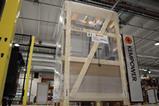Volvo Trucks is expanding its use of low-CO2-emission steel in its vehicle production. The steel, produced using recycled materials and fossil-free energy, will be incorporated into tens of thousands of Volvo trucks starting next year.

Volvo plans to use the low-emission steel in the frame rails of approximately 12,000 Volvo FH and FM trucks in the coming year. According to the manufacturer, this change is expected to result in a reduction of 6,600 tons of CO2 equivalents.
Jan Hjelmgren, Senior Vice President Product Management and Quality at Volvo Trucks, stated: “This is an additional step towards our zero emissions vision. Steel is one of the main materials in our trucks. We are also looking to exchange other materials, such as aluminium and plastic, to low emission alternatives.”
The low-CO2-emission steel is produced by Swedish steel company SSAB and is called SSAB Zero. It is manufactured using recycled material, fossil-free electricity, and biogas. Volvo reports that this production method reduces CO2 emissions by approximately 80% compared to conventional steel production using fossil energy.
Volvo Trucks first introduced this type of steel in its electric trucks in 2022 and is now expanding its use to include all drivelines. The company plans to increase the use of this steel in more truck models and other truck components as its availability grows.
According to Volvo, steel comprises about 47% of a Volvo FH diesel truck and represents approximately 44% of the CO2 emissions from production (cradle to gate) out of the total 21 tonnes of CO2 equivalents for the truck.
Hjelmgren added: “We are continuously striving to further minimise our climate footprint. We are also moving towards greater circularity in both our operations and our trucks. Many of our factories, transports and dealers are today running on renewable energy.”
Volvo Trucks states it is committed to the Paris agreement and aims to achieve net-zero greenhouse gas emissions in its supply chain by 2040 at the latest.
The company is collaborating with several suppliers to source low-CO2-emission steel, which it sees as an important complement to traditional and recycled steel used in its trucks.


















